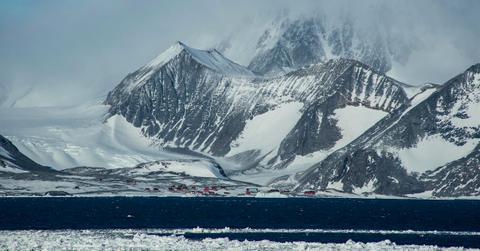Antarctica Weather Just Hit a New High: Summer Temperatures
Antarctica may have just hit its highest temperature ever recorded.
Updated Feb. 26 2020, 10:52 a.m. ET

Antarctica, the continent known for, well, being very cold, is getting warmer. On Thursday, Feb. 6, Antarctica hit a temperature of 64.9 degrees Fahrenheit (or 18.3 degrees Celsius), possibly the highest temperature ever recorded on the continent.
As reported by AFP, Argentina's National Meteorological Service recorded the temperature on an Argentine research base called Esperanza. The base is located on the northern tip of the Antarctic peninsula in an area known as Argentine Antarctica, not too far from Argentina itself (which is located in southern South America). The region was claimed as a national territory by Argentina more than 100 years ago. According to AFP, the previous highest recorded temperature in Antarctica was 63.5 degrees Fahrenheit (or 17.5 degrees Celsius) in March 2015.
The United Nations' weather agency, the World Meteorological Organization (WMO), is currently investigating the temperature recording, as reported by The New York Times. The agency is doing so in order to verify that the temperature is accurate, and to see if it really breaks the record for the highest recorded temperature on the continent.
“Everything we have seen thus far indicates a likely legitimate record but we will of course begin a formal evaluation of the record once we have full data from SMN and on the meteorological conditions surrounding the event," Randal Cerveny, WMO’s Weather and Climate Extremes rapporteur, said in a statement.
So assuming the recorded temperature is accurate, what exactly accounts for it? "The record appears to be likely associated (in the short term) with what we call a regional 'foehn' event over the area: a rapid warming of air coming down a slope/mountain," Cerveny said.
The temperature on the northern tip of the Antarctic peninsula is actually one of the fastest warming areas on Earth, according to the WMO. The temperature in the region has increased by nearly 37.4 degrees Fahrenheit (3 degrees Celsius) over the last 50 years; plus, the Antarctic ice sheet is losing more ice every year, and ocean temperatures are rising as well, according to the WMO.
Rising global temperatures are unquestionably linked to the climate crisis. As human activities (namely burning fossil fuels) continue putting greenhouse gases into the air, the global temperature continues to rise. That is why the central tangible goal of the Paris Agreement is to "strengthen the global response to the threat of climate change" by keeping this century's global temperature rise at no more than 1.5 degrees Celsius (34.7 degrees Fahrenheit) above pre-industrial levels. To do this, the Paris Agreement asks that all countries who signed the agreement (nearly every country on the planet) set goals to bring their greenhouse gas emissions to net zero by the second half of the century.
If we want to keep the climate crisis at bay, people all over the planet need to seriously work to reduce greenhouse gas emissions. Hopefully news about Antarctica's (likely) record-breaking high temperature will help inspire governments and corporations around the world to start changing laws and policies.